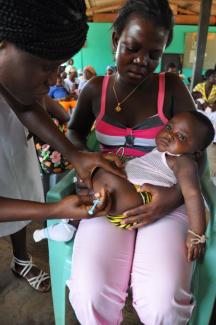2030 Agenda
Improvable partnerships

The study “Partnerships at the service of the sustainable development agenda” was written by Marianne Beisheim and Anne Ellersiek of the German Institute for International and Security Affairs (SWP – Stiftung Wissenschaft und Politik). It focuses on multi-stakeholder partnerships (MSPs). These are long-term cooperative efforts that involve state and non-state actors (such as non-governmental organisations or private-sector businesses) and aim to promote the common good.
According to SDG 17, MSPs must contribute to mobilising knowledge, technology and financial resources for SDG achievement. An examples of a successful MSP is the GAVI vaccination alliance, which relies on the governments of developed and developing countries, the World Health Organization, the World Bank, the Bill & Melinda Gates Foundation, NGOs, vaccine manufacturers, research institutions and private donors.
To be successful, a partnership must be effective, inclusive and act responsibly, the scholars argue. Numerous preconditions must be met, which is why “targeted frameworks” and “continuous learning processes” are important. An MSP’s work should be reviewed and improved constantly.
Among other things, the authors present the results of a survey of international actors from UN organisations, donor institutions, governments and private initiatives. Their respondents assessed what partnerships have achieved so far and commented on what framework conditions would serve future partnerships.
All respondents agreed that partnerships must become more transformative, inclusive and responsible. However, opinions diverged as to whether and how this can be done. According to Beisheim and Ellersiek, many NGOs completely rejected public-private partnerships (PPP) that involve the private sector. At the very least, the NGOs argued, governments should have decision-making power and impose strict rules on companies.
In contrast, more business-oriented groups rejected too much bureaucracy, arguing that red tape would deter potential partners and prevent innovation and flexibility. However, most respondents took a pragmatic stance. They wanted to build partnerships, but often did not know exactly how. Beisheim and Ellersiek regret that they are unable to provide tangible recommendations on how to improve MSPs. Only few interviewees offered tangible ideas.
The major part of their study discusses the extent to which the UN, donor institutions, governments or private actors are already providing “meta-governance” in order to establish, steer and review partnerships in a more targeted manner. The authors understand meta-governance to mean overarching principles and rules that serve to boost partnerships. Once more, the results are mixed. Some approaches to meta-governance have been taken, but action is fragmented and often incoherent.
As an example of meta-governance, the authors point out donor governments using the allocation of funds to promote and shape partnerships, regulations and conditions. However, donors have not yet made sufficient use of their potential.
Germany currently co-chairs the Global Partnership for Effective Development Cooperation (GPEDC) together with Bangladesh and Uganda. One of the objectives is to build partnerships in accordance with the principles of aid effectiveness. According to the authors, Germany should push the topic forward. They consider it useful for the GPEDC to provide a platform on which partnerships could exchange experiences and work together.
Link
Beisheim, M. and Ellersiek, A., 2018: Partnerschaften im Dienst der Agenda für nachhaltige Entwicklung (SWP) (only in German):
https://www.swp-berlin.org/fileadmin/contents/products/studien/2017S22_bsh_elk.pdf







